|
|
|
Sort Order |
|
|
|
Items / Page
|
|
|
|
|
|
|
| Srl | Item |
| 1 |
ID:
106925
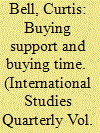

|
|
|
|
|
| Publication |
2011.
|
| Summary/Abstract |
History provides many examples of benevolent dictators who become increasingly repressive and new democracies that take years to improve public welfare. I account for this temporal variation in public goods provision by considering how regime consolidation changes leaders' incentives to provide public goods. To stay in office, all leaders must maintain a sufficient level of support from those possessing the power to replace the leader via institutional processes. Leaders of unconsolidated regimes face additional threats posed by viable extra-institutional challengers, such as coup plotters and revolutionaries. Tests on public goods spanning political freedoms, government expenditures, education, and health generally suggest leaders' incentives for public goods provision change as regime consolidation insulates leaders from these extra-institutional threats to power. Regimes with inclusive institutions spend more on public goods as they consolidate and become less vulnerable to elite demands. Exclusive regimes spend more on public goods when they are vulnerable to the excluded masses, but become increasingly repressive as they become insulated from popular uprisings. Consequently, consolidation magnifies the positive effect of democracy on public goods provision. These findings have important implications for the literatures on public goods provision and regime survival.
|
|
|
|
|
|
|
|
|
|
|
|
|
|
|
|
| 2 |
ID:
106930
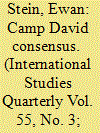

|
|
|
|
|
| Publication |
2011.
|
| Summary/Abstract |
This paper explores the nature, background, and evolution of the "Camp David consensus." Under this consensus, Egyptian intellectuals and political movements broadly accept that the Egyptian regime must deal constructively and "correctly" with Israel as a state, but insist that society has the right and responsibility to resist Zionism. The consensus rests on particular ways of understanding Israel, and the nature of the Arab-Israeli conflict, that can be traced back to the formative years of the Egyptian republic under Nasser. This has served the interests of both regimes and opposition movements and in this sense represents a "double instrumentalization" of foreign policy. The paper, which examines a range of regime and intellectual pronouncements during the Nasser and Sadat periods, as well as more recently, challenges the growing use within International Relations, particularly in the Middle East context, of the concept of "identity" to explain state behavior.
|
|
|
|
|
|
|
|
|
|
|
|
|
|
|
|
| 3 |
ID:
106936
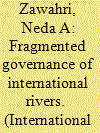

|
|
|
| 4 |
ID:
106932
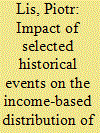

|
|
|
|
|
| Publication |
2011.
|
| Summary/Abstract |
The study applies time series analysis to establish whether income-based transference of international terrorism took place in reaction to the rise of the fundamentalist-based terrorism, the end of the Cold War, 9/11, and the 2003 Iraq invasion. It introduces several extensions to an article by Enders and Sandler (2006); for instance, it uses two independent data sets and presents an alternative approach to the events in Iraq. The differences in results between this paper and Enders and Sandler (2006) are caused by the lack of consistency in employing the World Bank's income classification by the two authors. This study finds that the rise of fundamentalist terrorism brought increases across all countries, while the post-Cold War era resulted in a reduction in attacks only in high- and medium-income countries. 9/11 appeared to have had no long-lasting impact on the distribution of terrorism, while the Iraq invasion seemed to have reduced international terrorism in rich states.
|
|
|
|
|
|
|
|
|
|
|
|
|
|
|
|
| 5 |
ID:
106928
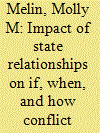

|
|
|
|
|
| Publication |
2011.
|
| Summary/Abstract |
This paper examines if, when, and how states act to manage militarized disputes. I argue that the relationship between the third party and disputants, the management history, and the characteristics of the conflict help us understand when management occurs and the management techniques employed. I find substantial evidence that biased third parties are quick to offer management services and to employ economic and diplomatic techniques. Conditions that increase the perceived probability of conflict resolution, such as previous conflict management, and factors that lower the cost of conflict management, such as costly conflict, lead to the timely use of diplomatic and verbal techniques. The findings offer significant contributions to both the conflict management and alliance literatures.
|
|
|
|
|
|
|
|
|
|
|
|
|
|
|
|
| 6 |
ID:
106923
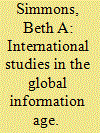

|
|
|
|
|
| Publication |
2011.
|
| Summary/Abstract |
The Global Information Age poses new and interesting questions for the study of international affairs. This Presidential Address surveys recent developments in commercialized and globalized information technologies that have and will continue to impact political and social relationships around the world. These new technologies affect power relationships among states, as well between states and civil society. They also present possibilities for new forms of global accountability and participation in governance. Finally, a range of technologies offer new and powerful ways to collect data for our research that allow us to ask new questions. President Simmons concludes as a result that exploratory empirical research is more enticing than ever before, but cautions that we should never think we can outsource the hard job of thinking to the very technologies that make innovative research possible in the first place.
|
|
|
|
|
|
|
|
|
|
|
|
|
|
|
|
| 7 |
ID:
106924
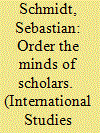

|
|
|
|
|
| Publication |
2011.
|
| Summary/Abstract |
References to the Peace of Westphalia have played an important role in the discourse of international relations. Originally referred to as a concrete historical event and associated with a variety of meanings, such as the triumph of state sovereignty, the establishment of a community of states, and even the beginnings of collective security, the Peace was later transformed into a conceptualization of the international system. Beginning in the late 1960s, phrases like "Westphalian system" came to convey a package of ideas about international politics limited to the supremacy of state sovereignty, territoriality, and nonintervention, to the exclusion of other meanings. This conceptualization serves as a popular and convenient contrast to a more globalized order, but there are problems with its use: first, because the Westphalian system is an ideal-type that might never have actually existed, the impact of globalization may be exaggerated by scholars who employ it. Second, its use implies a linear progression from some Westphalian configuration toward some "post-Westphalian" state of affairs, whereas actual system change is likely to be more complex.
|
|
|
|
|
|
|
|
|
|
|
|
|
|
|
|
| 8 |
ID:
106933


|
|
|
|
|
| Publication |
2011.
|
| Summary/Abstract |
Why do we observe economic sanctions despite strong doubts regarding their effectiveness? While the symbolic use of sanctions is advanced as an alternative to the instrumental use explanation, no one has assessed this alternative explanation empirically. I investigate the symbolic use of sanctions for domestic political gain in the United States, assessing in particular the effect of sanctions imposition on US presidential approval ratings. Findings suggest that policymakers benefit from imposing sanctions through increased domestic support. This domestic political gain can present policymakers with an incentive to use sanctions as a low-cost way of displaying strong leadership during international conflicts.
|
|
|
|
|
|
|
|
|
|
|
|
|
|
|
|
| 9 |
ID:
106934


|
|
|
| 10 |
ID:
106927


|
|
|
|
|
| Publication |
2011.
|
| Summary/Abstract |
The paper discusses the epistemological and normative problems arising for constructivists when attempting to forecast international events but argues that forecasting is both scientifically rewarding as well as normatively desirable. Constructivism has strengths in conceptualizing forecasting as a social activity that can shape the future itself but also weaknesses in formulating substantive mid-range theories and drawing on insights from other areas. The paper uses the debate about the European Union as an evolving military power to exemplify the normative as well as the epistemological potential of constructivist forecasting. It argues that insights from strategic culture research are particularly suited to outline trajectories of the likely when combined with the assessment of internal and external drivers of ideational and material change, the examination of discontinuities, and key uncertainties.
|
|
|
|
|
|
|
|
|
|
|
|
|
|
|
|
| 11 |
ID:
106926


|
|
|
|
|
| Publication |
2011.
|
| Summary/Abstract |
This article argues that constructivists committed to reflexivity should be students of the future. It notes that both conventional and critical approaches do not sufficiently engage with the problem of future uncertainty in the process of identity formation and neglect its behavioural implications. Against this backdrop, the article regrounds constructivism in a temporal ontology and the argument that humans, in the face of contingency, seek to establish visions of a meaningful future. It discusses how visions, as utopias and/or dystopias, define possibilities of being and thereby provide actors with a sense of direction, and it differentiates between "robust" and "creative" visions to highlight two ways in which such possibilities are manifested. In doing so, the article encourages constructivists to become more attentive in identifying the visions which enable and bind creative agents in the process of realization.
|
|
|
|
|
|
|
|
|
|
|
|
|
|
|
|
| 12 |
ID:
106931
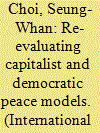

|
|
|
|
|
| Publication |
2011.
|
| Summary/Abstract |
After replicating Oneal and Russett's (International Studies Quarterly, 41, 1997, 267; Journal of Peace Research, 36, 1999, 423) democratic peace model, Gartzke's (American Journal of Political Science, 51, 2007, 180) study contends that "capitalism, and not democracy, leads to peace. Additional research is needed to corroborate, extend, and even refute the findings reported here." In response to this open invitation, this study re-evaluates Gartzke's capitalist peace model along with Oneal and Russett's democratic peace model. This study identifies that while the capitalist peace model suffers from model misspecification, observation omission, and sample selection bias, the democratic peace model commits measurement error. After correcting these four problems, this study uncovers that while capitalism does not emerge as a cause mitigating militarized disputes or wars in a consistent manner, democracy does.
|
|
|
|
|
|
|
|
|
|
|
|
|
|
|
|
| 13 |
ID:
106935
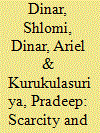

|
|
|
|
|
| Publication |
2011.
|
| Summary/Abstract |
Water scarcity is popularly associated with inter-state conflict, yet the academic literature also touts scarcity as an important variable for understanding cooperation over international freshwater. Building on studies that consider the relationship between scarcity and hydro-political cooperation, this paper empirically investigates why water treaties are negotiated for some rivers and between some riparians, and not others. Rather than considering a linear relationship between scarcity and cooperation, this study hypothesizes a curvilinear relationship expecting agreements to emerge in situations where scarcity is moderate rather than very low or high. Additional variables considered for understanding treaty formation include level of governance among the riparian states, prevailing power dynamics along the river, overall inter-riparian relations (measured by trade, diplomatic ties, and militarized disputes), and the geographical configuration of the entire river. The hypothesized curvilinear relationship between water scarcity and cooperation finds significant support in the empirical analyses. Governance, diplomatic relations, and trade are likewise found to be salient in explaining the levels of cooperation. The geographical configuration of the river was significant in only part of the estimates, and the militarized disputes variable was found to be insignificant across all models. Finally, while results confirm that cooperation may not depend on power asymmetries within riparian dyads, as suggested by some theories, the paper does find support for the contention that more developed states are in a position to provide incentives, such as financial transfers, to less-developed states so as to facilitate an international agreement.
|
|
|
|
|
|
|
|
|
|
|
|
|
|
|
|
| 14 |
ID:
106929
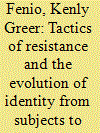

|
|
|
|
|
| Publication |
2011.
|
| Summary/Abstract |
Over the last decade, thousands of HIV/AIDS associations have sprung up across Africa to deal with high infection rates. This essay compares associations in South Africa, Mozambique, and Swaziland by examining how they work within the public arena, how issues are framed, and what the implications are for citizenship. Overall, I argue that South Africans are most free in their ability to critique government and vocalize opposition; associations have varying levels of "civicness" (with Swaziland least civic, South Africa most, and Mozambique in between); the framing of HIV issues as pertaining to human rights is a positive aspect for development; association tactics are a mix of African reciprocity and new identities; and international linkages do help build up, albeit sporadically, transnational networks of volunteers in new public space who stand up for what they define as their rights.
|
|
|
|
|
|
|
|
|
|
|
|
|
|
|
|
|
|
|
|
|